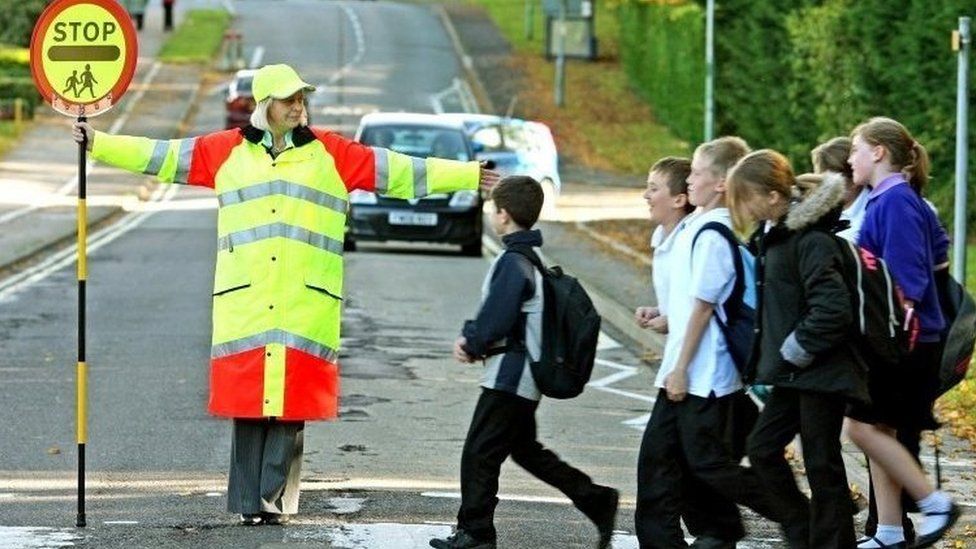Schoolchildren safety fear over fewer lollipop men and women
- Published
- comments

Safety campaigners say cuts to the number of lollipop men and women near schools are "jeopardising lives".
The number of them funded by councils in Great Britain has fallen by 1,500, almost a quarter, in five years, figures obtained by the BBC show.
Some councils are consulting on removing funding for crossing wardens entirely due to budget pressures.
The Local Government Association said councils were trying to maintain crossing patrols wherever possible.
Figures on the cuts in lollipop warden posts equate to a loss of almost one in four from outside schools.
The figures do not include volunteers or those now funded by schools or other groups, meaning there may be other wardens operating. Traditionally, the role has been a service run and funded by councils.
'Preventing tragedies'
Stephen Twigg, a Labour MP who campaigns to improve road safety by schools, said parents would be concerned.
"School crossing patrols play a vital part in preventing tragedies from occurring but they have borne the brunt of cuts in government funding to local authorities in recent years," he said.
"The safety of children should not be compromised as a result."
The London borough of Hounslow went from employing 22 wardens in 2013 to just two in an area with 25,000 state-funded primary school pupils.
Newcastle City Council has "reluctantly" cut officer numbers from 64 in 2013 to seven - a drop of almost 90% - because of government cuts.
In Kent, the largest education authority in Britain, the council now employs 137 wardens compared to 258 five years ago - a loss of 121.
The council said it had struggled to recruit people to vacant posts and had built a zebra or pelican crossing instead at a number of sites.
The Scottish council of Midlothian was one of the few to increase the number of wardens it has available, with numbers jumping 20% from 54 in 2013 to 65.
Of the nine councils to have revealed an increase in staff, five were in Scotland.
The BBC contacted every local authority with responsibility for lollipop people. Two thirds of councils replied with comparable data, meaning the real loss of staff could be substantially higher.
About 85% of authorities that responded to a BBC Freedom of Information request had cut warden numbers since 2013 and only 7% had increased them.
You may also be interested in:
Road safety charity Brake agreed the cuts are "jeopardising lives".
Joshua Harris, director of campaigns, said: "Last year, 1,638 children were killed or seriously injured while cycling or walking on British roads - that's more than four families receiving devastating news every day.
"We need action now, with investment in safe crossings for children, more investment in cycling and walking infrastructure and 20mph speed limits as the default in communities."
Rosaleen Littlejohn, who has spent the past decade serving 12 schools in Hackney, said wardens act as the "eyes and ears" of the area.
From her spot outside Sir Thomas Abney Primary School the 72-year-old sees her role as important to everyone, young and old.
"As well as for safety, I feel we are here to help the community," she said.
"It's not just for children either - one year a lady in her 80s was blown over in the wind on this road. Now she won't cross the street without holding my arm.
"I really enjoy it, it's rewarding to see the look on the kids' faces, as they are always so pleased to see me."
Not a legal obligation
Local authorities have to promote road safety, but providing lollipop people is not a legal obligation.
Some councils are even considering pulling money from their service entirely.
Staffordshire's wardens are under threat, as the council consults on removing all 240 positions from their payroll from September 2019 because of "unprecedented financial challenges".
The council would still employ wardens and provide training but funding would be at the discretion of parents or schools.
Birmingham City Council - which has cut numbers heavily in recent years - may remove all its officers by not replacing them when they leave or retire.
The council is encouraging parents and schools to step in and raise the funds, with the council providing training, uniforms and supervision.
Wardens typically earn between £7.83 to £10.55 an hour and work a few hours a week.
To install a zebra or pelican crossing, as some councils have been doing to replace wardens, it can cost up to £30,000 and £50,000 respectively.
The Local Government Association said councils try to maintain school crossing patrols wherever possible.
"Many councils have been forced to review this discretionary service due to significant pressures on their budgets and increasing demand for statutory services, such as children's services and adult social care," said transport spokesman Martin Tett.
Data journalism and charts by Daniel Wainwright
- Published22 August 2018
- Published9 February 2018
- Published21 February 2018